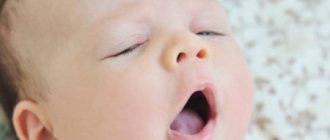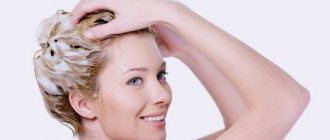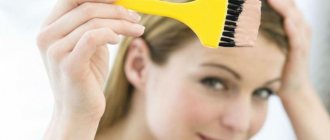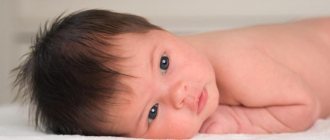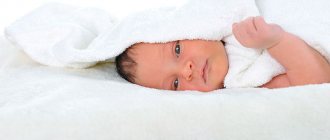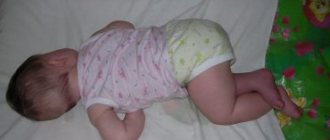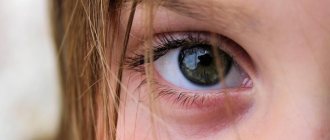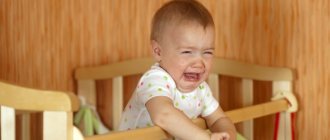Any parent considers it his duty to raise a healthy, strong child. But what if the scalp grows slowly and unevenly. And sometimes, to get rid of this problem, parents use dubious methods to try to correct the situation without turning to specialists.
In reality, there are many reasons for such a deviation, and for such a disease there are a number of scientifically based treatment methods. In this case, it is important to seek advice from doctors such as a trichologist and pediatrician.
Process Features
Options at birth
Questions about why a child's hair grows slowly usually begin from the moment of birth.
It’s quite natural that every mother wants her baby to be the most beautiful, but you still need to take into account the peculiarities of child physiology:
Photo of a newborn with the first fluff on his head
- The initial length of hair is a parameter that is determined genetically. Some children are born completely bald, while others already have quite decent hair at the time of birth, so there is no need to sound the alarm.
- The next point is replacing the birth hair with the first real ones. As a rule, this happens in the first one and a half to two months: thin rods fall out, and in their place new, stronger and tougher ones grow.
Note! Naturally, they will be tougher only in comparison with baby fluff. Full formation of hair takes quite a long time and is completed by approximately ten years.
- When a child's hair begins to grow, it may differ from the birth hair in structure and color. You also need to be prepared for this: the rapid transformation of a little blond into a brown-haired man fits perfectly within the norm.
As a result, we can say that until about two to three months, the process of hair growth occurs individually, depending on the hereditary characteristics and nuances of the course of pregnancy. But if the child’s hair does not grow even after this period, it is worth contacting specialists.
Hair growth calendar is highly individual
Note! This only applies to scalp hair. If, for example, hair grows on a child’s legs, and due to his age this should not happen in the next couple of years, it is worth contacting an endocrinologist. It is possible that the endocrine glands are overactive, which can lead to unpredictable consequences.
Causes of insufficient hair growth
Partial baldness can be caused by vitamin deficiency or calcium deficiency
Only a pediatrician can identify the real cause after a thorough examination, but for effective prevention, parents themselves need to know what can lead to improper formation of hair.
For convenience, we have summarized the basic information in a single table:
| Cause | Process description |
| Hereditary factor | If there are people in your family who are genetically prone to early baldness, or those who simply cannot boast of luxuriant hair, be prepared that the baby’s hair growth will also be slow. |
| Problems with breastfeeding | Slow formation of hair in the first months of life may indicate that the mother does not receive enough vitamins, minerals and nutrients. Accordingly, breast milk also cannot boast of a complete composition, and the baby’s hair suffers first of all.
|
| Calcium deficiency | It appears if the hairline has not formed (or has not completely changed) before 8 months. Other signs of calcium deficiency are a non-healing fontanelle and problems with tooth formation. |
| Vitamin D deficiency | This reason is directly related to the calcium deficiency described above. The thing is that a deficiency of this vitamin does not allow calcium (and with it phosphorus) to be effectively absorbed from the intestines, and the development of hair follicles is inhibited. |
| Neurological causes | Recently, experts have noticed that in children with increased nervous excitability (lability), hair grows more slowly than in calm ones. One of the reasons is a violation of sleep and wakefulness, which negatively affects the general condition of the body. If the hair grows poorly in a child 2 years old and older, then neurology is replaced by stress associated with various circumstances that traumatize the child’s psyche. Here it is important to carefully analyze the environment and take measures to neutralize negative impacts. |
Increased nervous excitability is one of the causes of problems
As you can see, the range of reasons causing slower hair growth in children is very wide. That is why it is important to consult with specialists in a timely manner and take measures to eliminate the identified causes.
Which doctors should I contact?
The first step is to consult a pediatrician for diagnosis. He will conduct a primary medical history, check the digestive system, and if this is the case, he will prescribe a set of medications and vitamins and adjust the baby’s diet.
If there are reasons related to hormones, your pediatrician will refer you to an endocrinologist. He, in turn, if necessary, will prescribe medications to stabilize hormonal levels.
For narrowly focused studies, you will be referred to a pediatric trichologist. This specialist deals directly with problems related to hair.
To get rid of stress factors, a neurologist will help you.
What should parents do?
Medical indications
If a child’s hair grows very poorly, especially in a situation where it is already high time due to age (i.e. at 6 - 8 months), we first turn to a specialist.
Our further actions depend on the diagnosis, but most often the instructions suggest the following:
The composition of breast milk also affects the condition of the hair.
- First of all, we adjust the menu for a nursing mother. We introduce fish, seafood, cottage cheese, milk, kefir, fresh fruits, cereals, etc. into the diet.
Note! All changes in diet must be made very carefully so as not to cause an allergic reaction.
- If the child is bottle-fed, it may be necessary to replace the milk formula with a fortified one. The price of such formulations is slightly higher, but they contain a larger amount of biologically active substances, which will help compensate for their deficiency in the child’s body.
- An older child will benefit from vitamins in drops or tablets, as well as preparations with minerals.
Fungal infections at an early age can lead to serious problems
More serious procedures should be carried out only if the cause of insufficient hair growth is a fungal infection. Then you need to first treat the child using fungicidal drugs, and only then think about the formation of hair.
Folk remedies
When wondering how to grow long hair for a child, many mothers often turn to traditional methods.
Alas, not all of them are effective, so you need to use the advice of grandmothers with caution:
- There is a belief that if a child is cut bald after a year, the regrown hair will be healthy and strong . In fact, such a procedure will not only not be beneficial, but can also lead to weakening of the hair follicles, so you should not expose your baby to such stress.
- The use of fermented milk products is quite effective . To strengthen your hair and increase its thickness, you should regularly wash your hair with yogurt or kefir. The applied “milk mask” should be left on the head for about 15 minutes and then rinsed off with warm water.
Advice! It is better to make curdled milk with your own hands from village milk - this way it is guaranteed to have no preservatives.
Washing your hair with kefir is very effective.
- At night you can apply burdock oil to the scalp . The biologically active substances contained in it stimulate the awakening of dormant follicles, so the hair after such treatment will be thicker.
- Homemade shampoos also help with insufficient hair thickness . We use freshly squeezed cabbage or carrot juice as their base, and to enhance the effect we add egg yolk, vegetable oil, oak bark decoction, etc.
Advice! But pepper tincture, which is very effective for adults, should not be used: children’s skin is thin, so irritation cannot be avoided even with a strong dilution of the active substance.
The child should spend enough time outdoors
It is also advisable to spend time in the fresh air: skin cells synthesize vitamin D under the influence of natural ultraviolet radiation, so walking will help normalize calcium metabolism. And without this element, the formation of healthy hair is almost impossible!
Should you cut your hair for thickness?
There is an established opinion among people that with frequent haircuts, hair begins to grow more intensively. But does cutting your hair really make your hair grow faster? There is no clear answer to this question. Experts have not identified any serious scientific evidence. In some cases, a rapid growth effect does occur. What can be stated unequivocally is the following: if the hair has a weak structure and vitamin-mineral nutrition, then rapid growth after the services of a hairdresser will definitely not follow. The only exception is cutting off the postpartum fluff. As a result of this procedure, the baby's full hair will begin to grow.
Heredity
It is one of the most common reasons why a child’s hair does not grow well.
The bulbs are laid in the 6th month of pregnancy and are often formed until birth. The genetic factor in the formation of the baby’s body is one of the main ones . Rare hair from a father or mother can be inherited by a child.
Moreover, if both parents suffer from slow hair growth, then the child’s chance of the same result increases as much as possible. If the parents have thick hair, the child may inherit the gene for weak hair from their grandparents.
Genetic factor is the determining factor in human hair growth
Causes of hair growth disorders
Baby's hair may not grow well for the following reasons:
- Metabolic disorder.
- Rickets.
- Heredity.
- Unbalanced diet.
- Stress.
Having found out the reasons why your baby has problems with hair growth, you should start working on eliminating them.
- If the baby is breastfed, you need to balance not only his diet, but also the diet of his mother. The diet should contain sources of phosphorus, calcium and protein such as spinach, fish, and egg yolk.
- You should take vitamins that promote better hair growth and strengthen hair follicles. To do this, you can buy special vitamin complexes containing vitamins PP, E, B 12, B6, A and C.
- It is necessary to consult an endocrinologist.
- If your baby is acting restless, you should make an appointment with a pediatric neurologist.
- If parents have a genetic predisposition to early baldness and poor hair growth, the child’s hair should be strengthened from birth with the help of special cosmetics.
- If you have symptoms such as decreased muscle tone, bone deformation, or severe sweating, you should see a pediatrician to rule out the diagnosis of rickets.
Hair growth problems can also be caused by the wrong choice of cosmetics for washing your hair. Therefore, it is important to choose the right product that will strengthen your hair and promote its growth.
Additional hair care measures include the following:
- A scalp massage that stimulates blood flow in the hair follicles, causing them to grow faster.
- Replacing shampoo with baby soap.
- Wash your hair once a week with egg yolk or kefir.
- Rinse with infusion of nettle, chamomile or burdock.
- Burdock mask that stimulates hair growth.
Quite often you can see bald patches on a child’s head. They appear on the baby’s head as a result of the first fuzz falling out. Since it falls out where friction occurs, bald patches most often form in the temporal part and on the back of the head. To avoid their appearance, it is necessary to regularly turn the baby in the crib from one side to the other.
Seborrheic dermatitis, which is yellow scales, can also be the cause of slow hair growth or lack thereof. They must be removed, otherwise the hair will continue to grow poorly. To remove crusts, you need to follow the following procedure:
- An hour before washing your hair, you need to rub warm, pre-boiled vegetable oil into the seborrheic scales. This can be sunflower oil or regular baby oil.
- After this, you need to put a scarf on the child’s head so that the crusts soften under the influence of temperature.
- Softened scales should be carefully combed out with a comb.
- Wash your hair thoroughly.
Why are some babies born bald and others with hair?
In general, it is impossible to predict how your baby will be born: how much hair he will have on his head and what color it will be. These are all phenotypic characteristics that will likely change with age. Even the color of a child’s hair can change over time: he may be born blond, although mom and dad are dark-haired or light brown, and darken over time.
Several factors are to blame:
- Combination of parental genes;
- Heredity;
- Parents' race.
For example, scientists from the UK have isolated the gene responsible for the expression of the Serine S1 protease enzyme in hair follicles. It is he who is responsible for the activity of hair growth and its thickness.
Designed by V. ivash/freepik
Most likely, some children are born bald, while others already have hair, precisely because of genetics. It is important to understand that both are absolutely healthy

